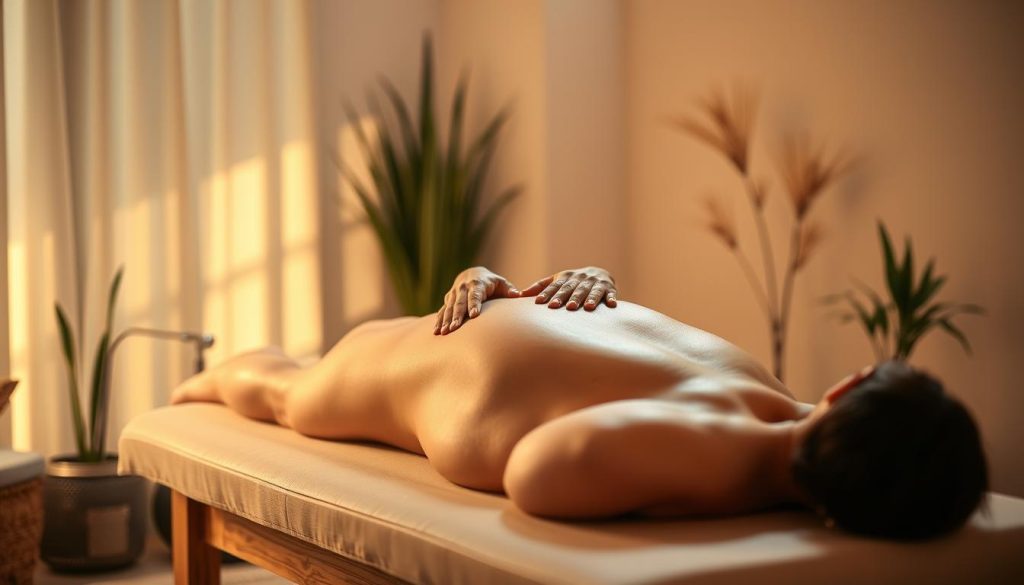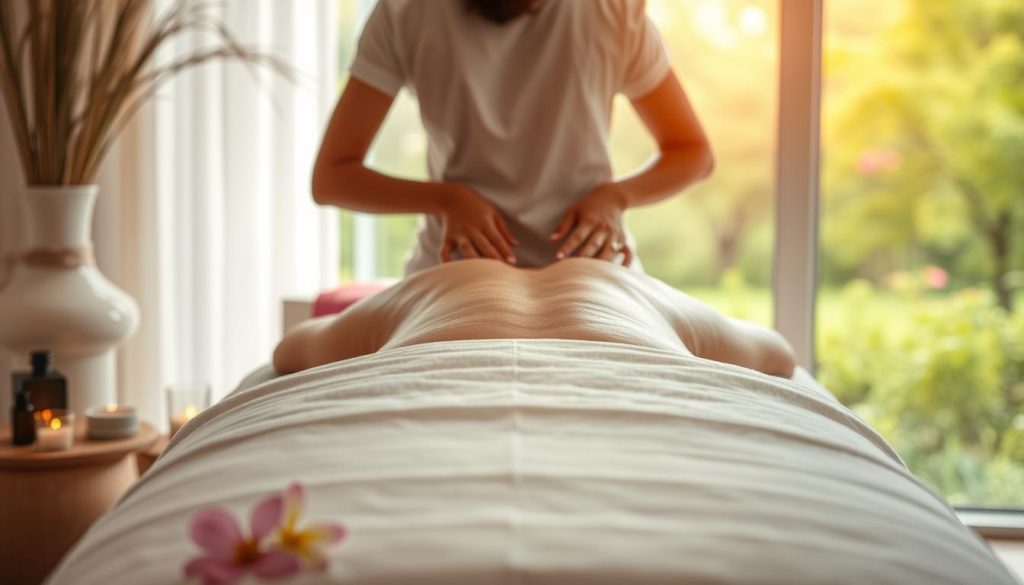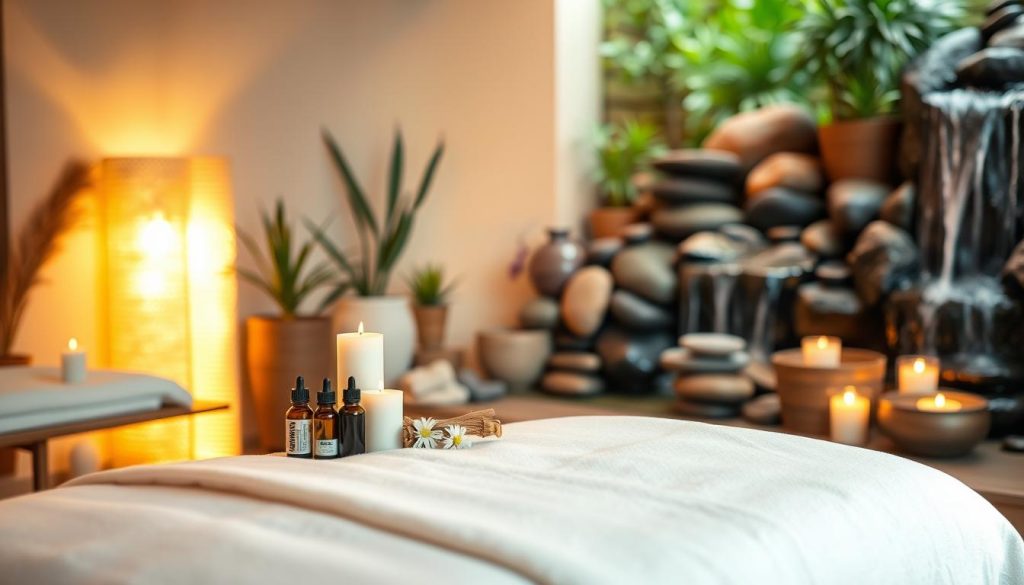Have you ever felt the weight of stress or tension holding you back? Imagine a moment where your body and mind find harmony, and you feel truly at ease. This is where the power of hands-on techniques comes into play. Whether you’re seeking relief from pain or simply a moment of relaxation, these practices can transform your well-being.
From gentle strokes to targeted pressure, these methods are designed to address your unique needs. They’re not just about physical relief but also about nurturing your overall health. Many people find these sessions to be a vital part of their self-care routine, helping them feel refreshed and rejuvenated.
Curious about how these techniques can fit into your life? Explore the different approaches available and discover what works best for you. Whether it’s for stress relief, injury recovery, or chronic pain, there’s a solution tailored to your needs.
Key Takeaways
- Hands-on techniques help relieve pain and promote relaxation.
- These methods are part of holistic health approaches.
- There are over 20 different styles to choose from.
- Sessions typically last between 60 to 90 minutes.
- They can be adapted for stress relief, injury recovery, or chronic pain.
What Is Massage Therapy?
Ever wondered how gentle touch can transform your well-being? Massage therapy is a hands-on practice that uses kneading, tapping, and strokes to manipulate your muscles and joints. It’s designed to relieve tension, improve circulation, and promote overall relaxation.
The Basics of Massage
At its core, massage therapy involves three foundational techniques: effleurage, petrissage, and tapotement. Effleurage uses gliding strokes to warm up the muscles. Petrissage involves kneading to release knots. Tapotement uses rhythmic tapping to stimulate blood flow.
These techniques work together to reduce tension and improve oxygen delivery to your tissues. A skilled therapist applies the right amount of pressure to address your specific needs, ensuring a customized experience.
How Massage Benefits Your Body
Studies show that massage therapy can reduce cortisol levels by 27% and increase lymphocytes by 31%. These changes lead to real-world benefits like better sleep, faster workout recovery, and enhanced immunity.
| Technique | Benefit |
|---|---|
| Effleurage | Warms up muscles, improves circulation |
| Petrissage | Releases muscle knots, reduces tension |
| Tapotement | Stimulates blood flow, energizes tissues |
During a session, your therapist will communicate with you to ensure comfort. They’ll use draping protocols and adjust pressure to meet your needs. This personalized approach makes each session effective and relaxing.
All Therapy Types Including Massage
Looking for a way to unwind and rejuvenate your body? Different techniques can help you achieve relaxation, ease discomfort, and improve overall well-being. Below, we explore three popular methods: Swedish, deep tissue, and hot stone.
Swedish Massage: Relaxation and Relief
Swedish massage is perfect for beginners. It uses long, gentle strokes toward the heart to improve lymphatic drainage and promote relaxation. This method is ideal for reducing stress and releasing endorphins, leaving you feeling refreshed.
Sessions typically last 60 to 90 minutes. It’s a great choice if you’re new to massage or simply want to unwind after a long day.
Deep Tissue Massage: Targeting Chronic Pain
For those with persistent aches, deep tissue massage focuses on the deeper layers of muscles and connective tissue. It uses slow, firm pressure to break up scar tissue and address chronic pain. This technique is particularly effective for sciatica and postural imbalances.
While it may cause some post-massage soreness, the long-term benefits are worth it. It’s a powerful tool for improving mobility and reducing discomfort.
Hot Stone Massage: Heat for Healing
Hot stone massage incorporates heated basalt rocks to relax muscles and enhance blood flow. The stones are heated to 120-150°F, helping to reduce tension and improve joint mobility. Studies show it can reduce fibromyalgia pain by up to 40%.
This method also boosts your metabolic rate by 15% during sessions, making it a holistic approach to healing and relaxation.
Specialized Massage Techniques
Are you an athlete looking to enhance performance and recovery? Or perhaps you’re expecting a baby and seeking relief from pregnancy discomfort? Specialized techniques are designed to meet these unique needs, offering targeted benefits for both athletes and mothers-to-be.

Sports Massage for Athletes
Sports massage is a game-changer for athletes. It combines deep pressure with dynamic stretching to improve flexibility and prevent injuries. Studies show it can enhance flexibility by 20% in runners, making it a must-have in your training routine.
This technique is also used by 78% of Olympians before events to boost performance. A certified therapist will focus on your specific needs, ensuring optimal results. Whether you’re recovering from tennis elbow or preparing for a marathon, sports massage can help.
Prenatal Massage for Expecting Mothers
For expecting mothers, prenatal massage offers relief from common pregnancy discomforts. It uses side-lying positions and bolstered tables to ensure safety and comfort. This method reduces lower back pain by 55% in third-trimester patients.
It’s important to note that deep tissue techniques should be avoided in the first trimester. Instead, the focus is on areas like calves and hips to improve circulation and reduce swelling. A skilled therapist with APTA certification will tailor the session to your needs.
Looking for a qualified therapist in Istanbul? Specialized techniques like sports and prenatal massage are available to help you feel your best.
Eastern-Inspired Massage Therapies
Eastern-inspired techniques offer a unique approach to well-being. Rooted in ancient traditions, these methods focus on balancing your body’s energy and promoting harmony. Unlike Western styles, they often involve fully clothed sessions and no oils, making them distinct and versatile.
Shiatsu: Balancing Energy Flow
Shiatsu, originating from Japan’s Anma tradition, uses thumbs and palms to apply pressure on specific points along your body’s meridians. This technique aims to stimulate energy flow and restore balance. Studies show it can improve sleep quality by 33% in concussed athletes.
Shiatsu targets 658 pressure points, addressing conditions like migraines and chronic pain. It’s a deeply relaxing experience that leaves you feeling rejuvenated and centered.
Thai Massage: Stretching and Pressure
Thai massage combines yoga-like stretches and acupressure to enhance flexibility and relieve tension. Performed on floor mats, it increases spinal mobility by 25% in office workers. This method is rooted in practices from Wat Pho temple, emphasizing holistic healing.
Thai massage is particularly effective for improving range of motion and reducing chronic discomfort. If you’re in Istanbul, you can experience authentic Thai massage tailored to your needs.
Both Shiatsu and Thai massage offer unique benefits, making them excellent choices for those seeking alternative approaches to wellness. Whether you’re looking to balance your energy or improve flexibility, these techniques provide a path to better health.
Massage for Stress and Anxiety Relief
Feeling overwhelmed by daily pressures? Massage offers a natural way to ease stress and anxiety. Whether it’s work-related tension or general unease, these techniques can help you find calm and balance.

Studies show that 60-minute sessions can reduce cortisol levels by 31%. This hormone is linked to stress, and lowering it promotes relaxation. Techniques like aromatherapy use lavender oil, which lowers anxiety by 47%. Reflexology, on the other hand, reduces work-related tension by 38%.
Massage also activates your parasympathetic nervous system within 15 minutes. This helps your body shift into a state of calm, improving circulation and overall well-being. For those dealing with PTSD, craniosacral therapy offers targeted relief.
| Technique | Benefit |
|---|---|
| Aromatherapy | Reduces anxiety by 47% |
| Reflexology | Lowers work-related stress by 38% |
| Craniosacral | Effective for PTSD relief |
A 2020 study found that hospital workers experienced a 52% reduction in burnout after biweekly sessions. This highlights the benefits of regular massage in high-stress environments. Combining massage with practices like meditation and staying hydrated can enhance its effects.
If you’re looking for more ways to manage stress, explore how masseuses can help with health problems. Regular sessions can transform your mental and physical health, leaving you refreshed and centered.
Massage for Pain Management
Struggling with persistent discomfort that won’t go away? Pain can disrupt your daily life, but hands-on techniques offer a natural solution. Whether it’s neuropathic, musculoskeletal, or chronic, targeted methods can provide relief and improve your quality of life.
For chronic pain, deep tissue techniques work best. They focus on deeper layers of muscles and connective tissue, breaking up scar tissue and reducing discomfort. Neuromuscular therapy, on the other hand, is ideal for conditions like disc herniation, targeting specific areas to restore function.
Studies show that combining these methods with traditional treatments can reduce opioid prescriptions by 30%. This makes them a cost-effective alternative for long-term pain management. Additionally, temperature therapies like ice massage can reduce acute inflammation, offering immediate relief.
| Technique | Benefit |
|---|---|
| Deep Tissue | Relieves chronic pain and muscle tension |
| Neuromuscular | Targets disc herniation and nerve pain |
| Ice Massage | Reduces acute inflammation |
However, it’s important to avoid deep pressure on thrombosed areas. Always consult a professional to ensure safety and effectiveness. Regular sessions can improve muscle health and reduce the likelihood of future injuries. For more insights, explore how massage therapy boosts muscle and joint.
Whether you’re dealing with back pain or chronic discomfort, these techniques can transform your well-being. Start your journey toward a pain-free life today.
Choosing the Right Massage for You
Choosing the right approach can make all the difference in your wellness journey. With so many different types available, it’s essential to match your needs with the right type. Studies show that 63% of users initially select the wrong method, highlighting the importance of informed decisions.
Start by identifying your goals. Are you seeking relief from acute pain, improving mobility, or simply relaxing? For desk workers, Swedish massage is ideal for unwinding. Marathon runners may benefit from sports techniques to prevent injuries. Those with arthritis often find relief with hot stone methods.
Consulting a professional therapist is crucial, especially for chronic conditions. They can assess your needs and recommend the best approach. Avoid unlicensed practitioners—always verify credentials like MBLEx in the U.S. to ensure safety and effectiveness.
- Pain Type: Acute vs. chronic.
- Mobility Goals: Flexibility or recovery.
- Relaxation Needs: Stress relief or general unwinding.
Many clinics offer trial sessions, such as 45-minute introductory packages at Massage Envy. These allow you to experience the benefits before committing. Online tools from associations like AMTA can also help you find the right fit.
For more guidance, explore different types of massage and their unique advantages. Whether you’re dealing with pain or seeking relaxation, the right choice can transform your well-being.
What to Expect During a Massage Session
Ready to learn what to expect during a wellness session? Whether it’s your first time or you’re a regular, understanding the process can help you feel more at ease. Most sessions last between 60 to 90 minutes, giving you ample time to relax and rejuvenate.
Before your session begins, you’ll fill out an intake form. This helps your therapist understand your needs and any areas of concern. You’ll then undress to your comfort level and lie on a padded table. Heated pads, bolster pillows, and ambient music set the tone for a calming experience.
Communication is key during your session. Your therapist will use a “pressure scale” (1-10) to ensure the pressure is just right. Don’t hesitate to request adjustments—your comfort is their priority. This tailored approach ensures your muscle tension is effectively addressed.
After your session, take time to hydrate and rest. Epsom salt baths and stretching routines can enhance the benefits. If you’re in the U.S., tipping 15-20% is customary. Many clinics also offer rebooking discounts for regular clients.
| Aspect | Details |
|---|---|
| Pre-Session | Intake forms, hydration, arrive early |
| Setup | Heated pads, bolster pillows, ambient music |
| Communication | Pressure scale, request adjustments |
| Post-Session | Epsom salt baths, stretching |
| Etiquette | 15-20% tipping, rebooking discounts |
For more insights on selecting the right professional, explore how to choose a massage therapist. Knowing what to expect ensures a smooth and enjoyable experience every time.
Finding a Qualified Massage Therapist
Finding the right professional can make all the difference in your wellness journey. A qualified massage therapist ensures your needs are met with expertise and care. Start by verifying their credentials, such as AMTA or NCBTMB certifications, which require 500+ training hours in most states.
In Turkey, check the T.C. Sağlık Bakanlığı registry to confirm legitimacy. Specialty credentials like NAMS for prenatal or NASM for sports techniques can also indicate expertise. Ask questions like, “How do you handle scar tissue?” or “Have you worked with [your condition]?” to gauge their experience.
Be cautious of red flags. Avoid therapists who skip health history intake, reuse linens, or have vague pricing. Clear communication about your goals and preferred pressure is essential for a tailored experience. For local options, consider clinics like PhysioAtHome or UrbanClinic in Istanbul.
Reading online reviews and testimonials can provide insights into a therapist’s reputation. Positive feedback often indicates a reliable professional. Additionally, ensure they follow proper hygiene and safety protocols, such as sanitized equipment and clean facilities.
For more tips on selecting the right expert, explore how to choose a massage therapist. Whether you’re seeking relief or relaxation, a qualified massage therapist can transform your well-being.
Massage Costs and Insurance Coverage
Curious about the financial side of wellness treatments? Understanding the costs and insurance options can help you plan better. In the U.S., sessions typically range from $75 to $125 per hour. In Turkey, premium spas charge 300-600 TL, while schools offer sessions for as low as 150 TL.
Did you know 12% of insurers cover medically necessary sessions? To maximize coverage, get a doctor’s prescription for chronic pain. You can also use HSA or FSA accounts to make it more affordable. Always verify benefits with your provider to avoid surprises.
Many clinics offer discounts for corporate wellness plans or package deals. For example, you might get 10 sessions for the price of 8. Be aware of hidden fees like late cancellation charges or aromatherapy add-ons. These can add up quickly if you’re not careful.
| Location | Average Cost |
|---|---|
| U.S. | $75-$125/hour |
| Turkey (Premium Spas) | 300-600 TL/session |
| Turkey (Schools) | 150 TL/session |
For those on a tight budget, sliding-scale clinics like Istanbul Terapi Merkezi offer affordable options. These programs adjust costs based on your income, making wellness accessible to everyone. Always consult your therapist to find the best payment plan for your needs.
For more details on how insurance can cover massage therapy, explore this guide. Knowing your options ensures you get the care you need without breaking the bank.
Conclusion
Ready to take the next step toward better health and relaxation? From Swedish for beginners to deep tissue for chronic pain, there’s a technique tailored to your needs. Thai massage enhances mobility, while combining methods like hot stone and reflexology can amplify the benefits.
Investing in regular sessions can save you thousands in painkiller costs. At $75 per session, it’s a cost-effective way to improve your quality of life. Always consult your doctor if you have post-surgical or high-risk conditions to ensure safety.
Why not book a trial session at a certified center near you? Experience the transformative power of these practices firsthand and start your journey to a more balanced, pain-free lifestyle today.
FAQ
What is massage therapy?
How does Swedish massage benefit the body?
What is deep tissue massage best for?
Can hot stone massage help with healing?
Who can benefit from sports massage?
Is prenatal massage safe during pregnancy?
How does shiatsu balance energy flow?
What makes Thai massage unique?
Can massage help with stress and anxiety?
How do I choose the right massage for me?
What should I expect during a massage session?
How do I find a qualified massage therapist?
Does insurance cover massage therapy?
Source Links
- https://www.chipperfieldphysio.ca/blog-1/6-different-types-of-massage-therapies-and-their-benefits
- https://www.aiam.edu/massage-therapy/types-of-massage-therapy/
- https://www.health.com/types-of-massage-7510143
- https://www.healthline.com/health/types-of-massage
- https://www.massageliabilityinsurancegroup.com/massage-therapist/types/
- https://pullman-ciawi-vimalahills.com/news/exploring-different-types-of-massage-and-their-incredible-health-benefits/
- https://www.wealdchiropractic.co.uk/what-are-the-16-different-types-of-massage/
- https://www.spafinder.com/blog/health-and-well-being/eastern-vs-western-style-massage-right/
- https://www.lemassage.com.au/exploring-the-harmony-of-eastern-and-western-massage-therapy-techniques/
- https://healthylifeessex.co.uk/articles/wellbeing/complementary-and-alternative-therapies/massage/thai-tui-na-massage-eastern-style-massage/
- https://totalhealthclinics.com/the-role-of-massage-in-reducing-stress-and-anxiety/
- https://compassionatehart.com/massage-therapy-anxiety-relief/
- https://www.hingehealth.com/resources/articles/types-of-massage-therapy/
- https://www.bodyworksphysio.ca/massage-for-pain-relief-scarborough
- https://healing-hands.us/2024/09/exploring-different-types-of-massages-finding-the-right-fit-for-you/
- https://chiropracticcareclinics.co.uk/types-of-massages-and-their-benefits/
- https://www.thebodylablondon.com/news/massage-therapy-guide-kensington
- https://www.amtamassage.org/find-massage-therapist/what-to-expect-at-massage-session/
- https://kaizenhealthgroup.com/what-to-expect-during-your-first-massage-therapy-session/
- https://decompressmassagetherapy.com/blog/choosing-massage-therapist
- https://www.hattclinic.co.uk/is-massage-therapy-covered-by-insurance/
- https://www.gethealthie.com/blog/is-massage-therapy-covered-by-insurance
- https://www.closingthegap.ca/5-different-types-of-massage-therapies-and-their-benefits/
- https://www.europeanreview.org/wp/wp-content/uploads/3843-3849.pdf






